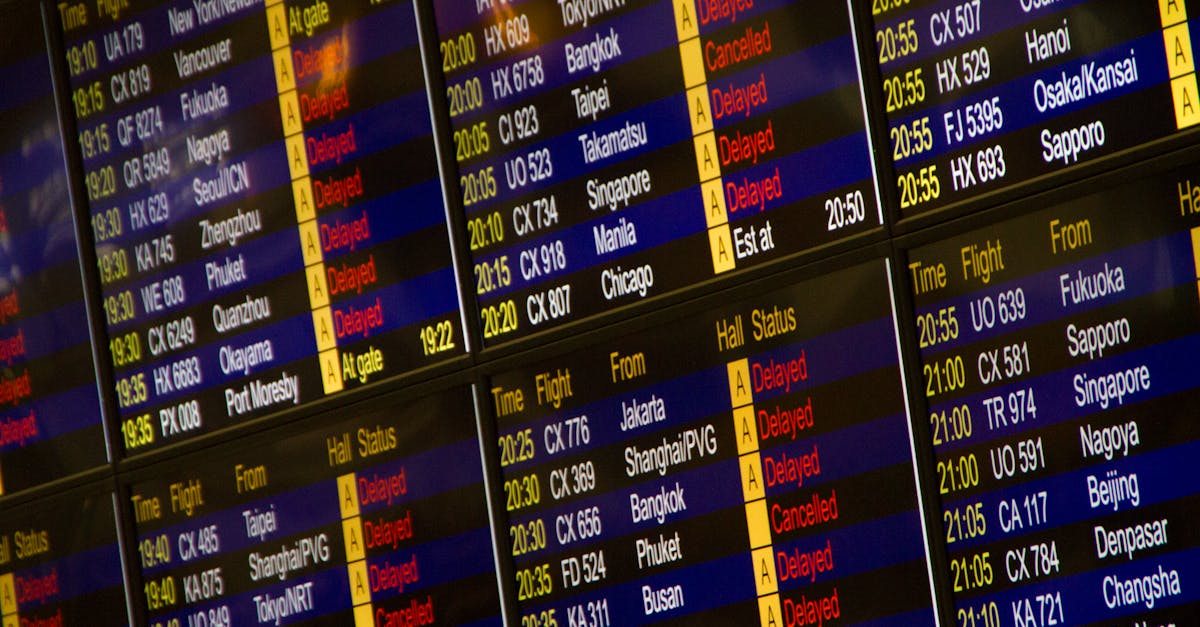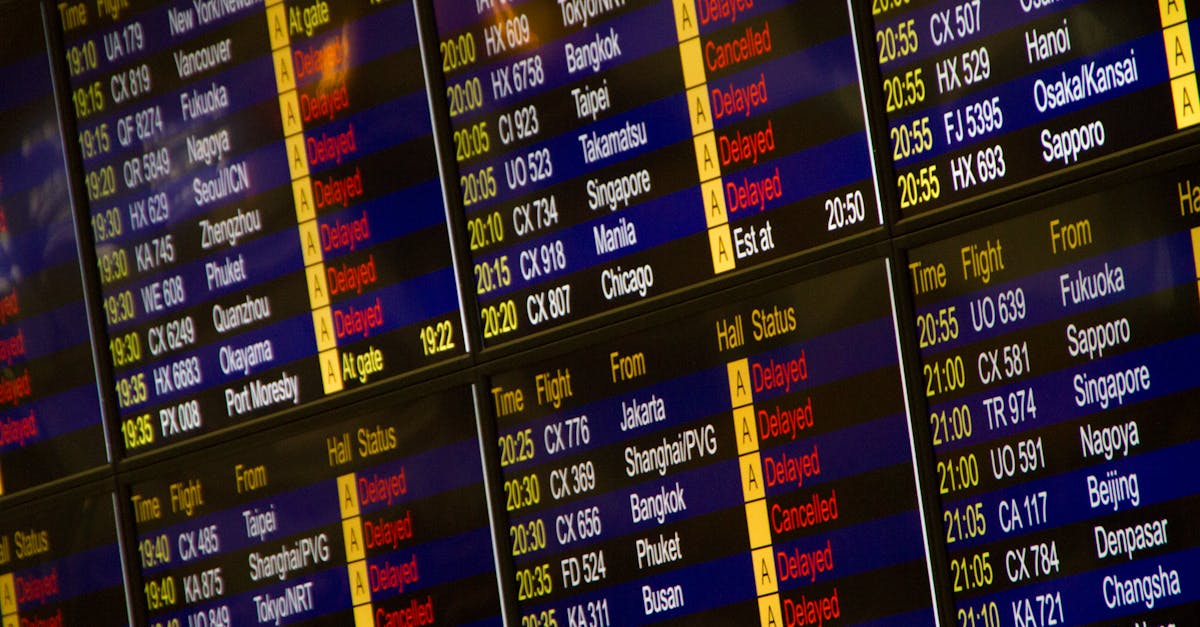How Airlines Use Data to Streamline Flight Operations
The Data-Driven Aviation Era
In today's fast-paced world, airlines are harnessing the power of data to revolutionize flight operations. As air travel continues to grow, the aviation industry is increasingly turning to data analytics to enhance efficiency. The digital transformation in aviation has paved the way for innovations that streamline operations, improve safety, and reduce costs. This data-driven approach allows airlines to make informed decisions, optimizing everything from flight scheduling to fuel management. With the advent of advanced technologies, the potential of data in flight operations is limitless. Indeed, the synergy between data and aviation is reshaping the skies.
Advertisement
Enhancing Efficiency with Predictive Analytics
One of the most significant data-driven advancements in aviation is predictive analytics. Through the collection and analysis of data from aircraft systems, weather patterns, and operational histories, airlines can predict and mitigate potential disruptions. Predictive analytics allows airlines to anticipate maintenance needs, minimizing unexpected delays and cancellations. By analyzing historical data, airlines can also optimize flight schedules to reduce bottlenecks and improve on-time performance. This proactive approach not only enhances operational efficiency but also elevates passenger satisfaction by reducing travel disruptions. Ultimately, predictive analytics is proving to be a game-changer in flight optimization.
Advertisement
Fuel Efficiency: The Green Revolution
Fuel management is a critical area where data plays a pivotal role. By analyzing data on fuel consumption, aircraft weight, wind patterns, and route efficiency, airlines can optimize fuel usage. This not only reduces operational costs but also minimizes the environmental impact of air travel, contributing to a greener, more sustainable aviation industry. Data analytics helps airlines determine the most efficient routes, considering prevailing winds and weather conditions. Furthermore, real-time data allows flight crews to make informed decisions mid-flight, adjusting routes as necessary to conserve fuel. Data-driven fuel efficiency is crucial for airlines aiming to balance profitability with sustainability.
Advertisement
Safety First: Real-Time Monitoring
Safety is an uncompromising priority in aviation, and data plays a crucial role in maintaining it. Through real-time monitoring of aircraft systems, airlines can detect anomalies or irregularities before they escalate into critical issues. Data from various sensors on the aircraft provides insights into engine performance, structural integrity, and other critical parameters. Advanced data analytics tools can identify patterns indicative of potential safety risks, enabling preemptive actions. This proactive safety management enhances not only passenger and crew safety but also the overall reliability of flight operations. Real-time data analysis is, therefore, a cornerstone of modern aviation safety protocols.
Advertisement
Optimizing Crew Management
Data analytics extends beyond flight operations, playing a vital role in crew management. By analyzing crew scheduling, rest periods, and workload distribution, airlines can optimize crew efficiency and well-being. Real-time data ensures that scheduling is efficient while adhering to regulatory requirements for rest and work hours. This optimizes labor costs and reduces fatigue-related errors, contributing to safer and more efficient operations. Additionally, data-driven insights assist airlines in personalizing crew training programs, ensuring crew members are well-prepared to handle various flight scenarios. Efficient crew management is, therefore, an integral aspect of overall flight optimization.
Advertisement
Personalized Passenger Experience
Personalization has become a key differentiator for airlines, and data is at the heart of this strategy. Through data analytics, airlines gain insights into passenger preferences, allowing for tailored travel experiences. Data-driven personalization can include customized seat assignments, in-flight amenities, and targeted promotions. By analyzing past travel data, airlines can offer personalized recommendations and services, enhancing customer satisfaction and loyalty. Moreover, real-time data enables airlines to provide prompt information regarding flight delays or changes, keeping passengers well-informed. Personalization powered by data not only improves passenger experience but also fosters brand loyalty.
Advertisement
Navigating Disruptions with Agility
Weather conditions, air traffic congestion, and unexpected technical issues pose significant challenges to flight operations. Data analytics equips airlines with the tools to navigate these disruptions effectively. By analyzing real-time data from multiple sources, airlines can make agile decisions to minimize delays and reroute flights as necessary. This capacity for quick adaptation is crucial in maintaining schedule integrity and mitigating operational hiccups. Furthermore, data-driven insights help airlines optimize airport operations, enhancing ground coordination and reducing turnaround times. In a world where disruptions are inevitable, data ensures airlines can respond decisively and efficiently.
Advertisement
Future Prospects: Autonomous Flights
The horizon of aviation technology is expanding, with autonomous flights being a potential reality. Data is a pivotal component in developing semi-autonomous and fully autonomous flight systems. By integrating data from sensors, artificial intelligence, and machine learning algorithms, airlines can enhance automation in flight operations. The concept of pilots acting as supervisors in semi-autonomous systems is gaining traction, driven by data insights. Autonomous technology promises to boost efficiency and safety by reducing human error. As the industry continues to advance, the relationship between data and autonomy will define the future of aviation.
Advertisement
Challenges in Data Utilization
Despite the benefits, there are challenges associated with data utilization in aviation. Data privacy and security remain significant concerns, necessitating robust measures to protect passenger information. Additionally, integrating data from various sources requires seamless interoperability between systems. Airlines must invest in advanced data infrastructure to ensure accuracy and reliability. The complexity of maintaining and analyzing vast amounts of data calls for skilled data professionals. Addressing these challenges is essential for airlines to unlock the full potential of data in flight operations, ensuring sustained progress in the field.
Advertisement
Conclusion: Soaring into the Future
As we navigate through the era of digital transformation in aviation, the strategic use of data is crucial for optimizing flight operations. From predictive analytics to personalized passenger experiences, data empowers airlines to enhance efficiency, reduce costs, and ensure safety. By leveraging data-driven insights, airlines can navigate disruptions with agility and innovation. However, addressing the challenges associated with data utilization is essential for sustained progress. As technology and data converge, the future of flight operations promises to be even more dynamic and efficient, heralding a new chapter in aviation history.
Advertisement

